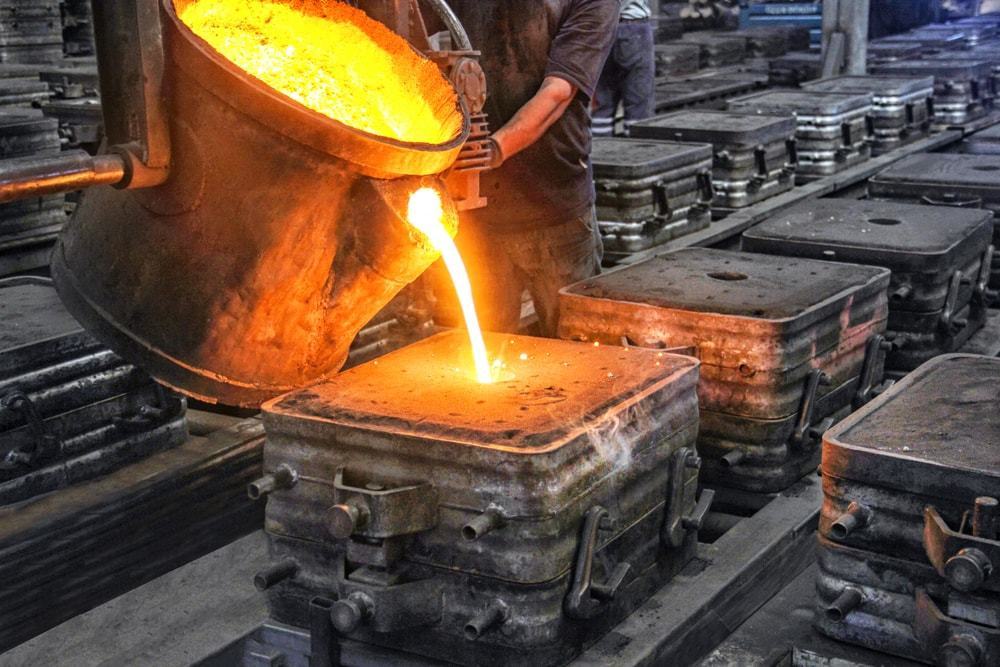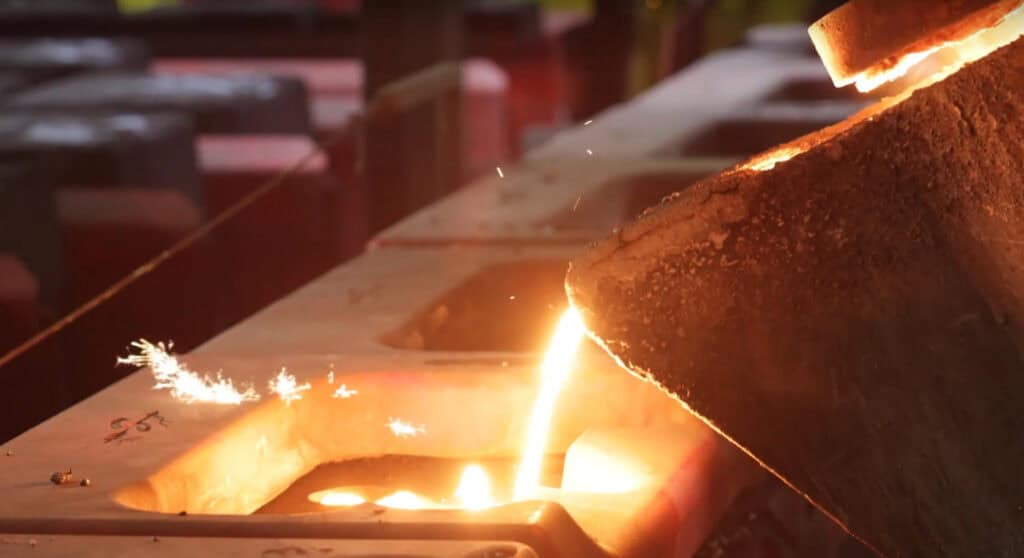Green initiatives in today’s Aluminum Foundry operations
Exactly How a Metal Foundry Adds To Sustainable Metal Production Practices
Metal foundries play a crucial function in advertising sustainability within the metal production industry. By integrating recycled products, they reduce reliance on virgin sources and reduce ecological impacts. Energy-efficient melting processes further reduce energy usage and exhausts. The journey toward lasting techniques includes even more than just reusing and power management. It encompasses a wider dedication to ethical sourcing and ingenious modern technologies. The ramifications of these methods are significant and warrant closer evaluation.
The Function of Recycling in Metal Foundries
While metal manufacturing has actually traditionally counted on virgin materials, the boosting focus on sustainability has resulted in a substantial change in practices, specifically in metal foundries. Recycling has actually become an essential component of this makeover, permitting foundries to repurpose scrap metal and minimize reliance on extracted resources. By incorporating recycled products right into their processes, foundries not only decrease ecological influence however also reduced manufacturing expenses.
Using recycled steels, such as light weight aluminum, steel, and copper, minimizes power usage and lowers greenhouse gas discharges connected with conventional mining and refining approaches. Foundries can attain top quality outputs by using advanced sorting and processing innovations to guarantee the purity of recycled products. This focus on recycling fosters a round economy, where waste is reduced, and sources are utilized effectively. Consequently, metal foundries play a pivotal role in promoting sustainable practices within the metal manufacturing sector.
Energy-Efficient Melting Strategies
Energy-efficient melting methods are essential for improving sustainability in metal manufacturing. These techniques substantially reduce energy intake throughout the melting procedure, which is just one of the most energy-intensive stages in metal production. Technologies such as induction melting, resistance heating, and microwave melting deal improved performance compared to conventional approaches. Induction melting, as an example, uses electromagnetic fields to generate warm straight within the metal, minimizing energy loss and supplying exact temperature level control.
In addition, carrying out heat healing systems can additionally boost performance by capturing and recycling waste heat created during melting. Using sophisticated insulation products and optimizing heating system styles likewise add to energy cost savings. By embracing these ingenious melting strategies, metal foundries can decrease their carbon impact, reduce functional costs, and add to a much more sustainable production landscape. The assimilation of energy-efficient methods not only lines up with ecological goals however likewise fulfills the growing need for responsible production methods in the metal sector.
Lasting Sourcing of Raw Products
Sustainable sourcing of resources is important for minimizing the ecological impact of metal production. This entails the boosted utilization of recycled metals, the adoption of honest mining methods, and efforts aimed at regional sourcing. By prioritizing these approaches, the market can promote liable resource management and assistance neighborhood economies.

Recycled Metal Utilization
Exactly how can industries effectively decrease their ecological influence while meeting the expanding demand for metal? One significant method is the application of recycled metal. By including scrap metal right into their production procedures, foundries can decrease the removal of virgin materials, thus minimizing and conserving all-natural resources power usage. Recycled steels call for less energy to procedure compared to their raw counterparts, resulting in reduced greenhouse gas emissions. In addition, using recycled metal aids draw away waste from garbage dumps, advertising a round economic climate. Industries that focus on recycled metal not only add to sustainability however also take advantage of cost savings connected with decreased product purchase. Recycled metal usage stands as a vital strategy for ecologically responsible metal production.
Moral Mining Practices
While the need for steels remains to increase, sectors are progressively identifying the value of ethical mining practices in ensuring responsible sourcing of resources. Ethical mining encompasses a dedication to ecological stewardship, social duty, and adherence to reasonable labor practices. Business are currently prioritizing collaborations with mines that demonstrate openness in their procedures, reducing environmental impact and valuing local communities. This technique not only cultivates a lasting supply chain but additionally boosts the track record of services included. By applying extensive criteria and certifications, industries can deal with unlawful mining tasks and promote the well-being of employees. Inevitably, moral mining techniques contribute considerably to a much more lasting metal manufacturing ecosystem, aligning economic development with ecological and social stability.
Local Sourcing Initiatives

Developments in Metal Casting Procedures
Technologies in metal casting processes are changing the industry by including advanced recycling strategies that reduce waste. Energy-efficient melting techniques are also being created to minimize energy intake during manufacturing. In addition, the usage of cutting-edge mold and mildew products adds to improved efficiency and sustainability in casting procedures.
Advanced Recycling Techniques
Advanced recycling methods are transforming metal casting procedures, substantially improving sustainability in the sector. These technologies concentrate on recycling and recovering scrap metal, substantially see this reducing waste and the demand for virgin products. Techniques such as hydrometallurgy and pyrometallurgy allow foundries to extract beneficial steels from used elements, making certain efficient source utilization. In addition, progressed sorting and purification modern technologies improve the high quality of recycled steels, making them suitable for high-performance applications. This not just reduces the environmental impact of metal production however also promotes a round economy by promoting the reuse of products. As these recycling methods continue to evolve, they assure to even more improve procedures within foundries and contribute to an extra lasting metal production landscape.
Energy-Efficient Melting Methods
While conventional melting approaches have actually long been the foundation of metal casting, recent innovations have actually presented energy-efficient strategies that considerably reduce power intake and emissions. Technologies such as induction melting and electric arc furnaces have gained importance, enabling precise control over temperature level and lowering the requirement for nonrenewable fuel sources. These approaches not only enhance energy effectiveness yet additionally promote much faster melting times, which equates to lower functional costs. In addition, technologies in warm recovery systems enable foundries to capture and reuse excess heat produced throughout the melting procedure. This holistic method to energy management not only supports lasting techniques but also settings metal foundries as leaders in the shift in the direction of greener production processes, additionally aligning with international sustainability objectives.
Ingenious Mold Products
As the need for even more effective and sustainable metal casting processes expands, the expedition of innovative mold and mildew materials has become a centerpiece in the industry. Traditional mold and mildew products often contribute to environmental difficulties, motivating the search for alternatives that decrease waste and power usage. Recent improvements consist of the advancement of eco-friendly binders and recyclable compounds, which not only improve mold and mildew performance but additionally lessen environmental influence. In addition, using 3D printing modern technology in mold development enables for intricate designs that decrease product usage and enable quick prototyping. These ingenious products not just boost casting precision however also line up with sustainability objectives, showcasing the industry's dedication to decreasing its carbon impact while maintaining top notch production criteria.
Lowering Waste With Advanced Modern Technology
Innovative technologies are transforming the metal production market by substantially reducing waste and improving effectiveness. Advanced information analytics and artificial intelligence formulas enable foundries to enhance manufacturing processes, lessening and determining ineffectiveness scrap material. Smart sensing units keep an eye on tools efficiency in real-time, allowing for predictive upkeep that lowers downtime and waste generation. In addition, additive production methods, such as 3D printing, permit the production of facility elements with very little product usage, substantially decreasing waste compared to traditional approaches.
Furthermore, closed-loop systems are coming to be more prevalent, where scrap metal and byproducts are recycled back into the production cycle, making sure that products are made use of to their fullest possibility - Aluminum Casting. This integration of innovation not just advertises source conservation however also boosts the total sustainability of metal manufacturing methods. By accepting these improvements, foundries can add to a much more sustainable future while keeping competitiveness out there
The Influence of Foundries on Carbon Impact Decrease
Foundries play an important duty in lowering the carbon impact of the metal manufacturing market by executing different lasting practices. By using energy-efficient innovations, such as electrical arc heaters, these facilities considerably reduced greenhouse gas emissions contrasted to typical techniques. Additionally, foundries significantly adopt renewable power sources, which also reduces their dependence on nonrenewable fuel sources.
Recycling scrap metal is one more about his essential method that foundries use, conserving resources and minimizing the need for virgin materials. This not just minimizes waste however likewise lowers the energy-intensive extraction processes related to mining. Moreover, the adoption of closed-loop water supply this website assists to minimize water usage and decrease wastewater discharge, adding to an extra lasting operation.
With these campaigns, foundries demonstrate their commitment to environmental stewardship, bring about a marked reduction in the total carbon impact of the metal manufacturing industry. Their recurring efforts are pivotal in the shift toward an extra lasting industrial landscape.
Regularly Asked Questions
What Kinds of Metals Are Most Typically Recycled in Foundries?
Light weight aluminum, copper, brass, and steel are among one of the most typically recycled metals in foundries. These metals are preferred as a result of their high recycling rates, financial value, and prevalent schedule, contributing greatly to industrial sustainability initiatives.
How Do Foundries Guarantee the Quality of Recycled Products?
Foundries ascertain the top quality of recycled materials through rigorous screening, arranging, and purification processes. They execute advanced innovations to assess make-up and eliminate impurities, assuring that the recycled steels satisfy sector criteria for efficiency and safety.
What Accreditations Exist for Sustainable Foundry Practices?
Various accreditations exist for sustainable foundry practices, including ISO 14001 for environmental monitoring, ISO 50001 for energy management, and LEED qualification for sustainable building techniques (Aluminum Foundry). These accreditations aid assure adherence to ecological and sustainability standards in procedures
Just How Do Foundries Gauge Their Carbon Impact Decrease?
Foundries determine carbon footprint decrease via tools like lifecycle analyses, energy audits, and exhausts tracking systems. They compare baseline emissions to present outputs, examining renovations in energy efficiency, product use, and renewable resource adoption with time.
What Are the Economic Advantages of Sustainable Metal Manufacturing?
Sustainable metal manufacturing offers financial benefits such as minimized operational expenses, increased performance, enhanced market competitiveness, and prospective federal government rewards. In addition, it fosters development and brings in eco mindful consumers, inevitably driving lasting profitability for companies.
Metal foundries play an essential duty in advertising sustainability within the metal manufacturing sector. While metal manufacturing has actually commonly relied on virgin materials, the increasing emphasis on sustainability has led to a significant shift in practices, especially in metal foundries. By incorporating scrap metal right into their manufacturing procedures, foundries can decrease the extraction of virgin materials, consequently lowering and preserving all-natural sources energy consumption. Foundries play an important role in minimizing the carbon impact of the metal production market by carrying out numerous lasting methods. Recycling scrap metal is another crucial practice that foundries employ, preserving sources and minimizing the requirement for virgin materials.